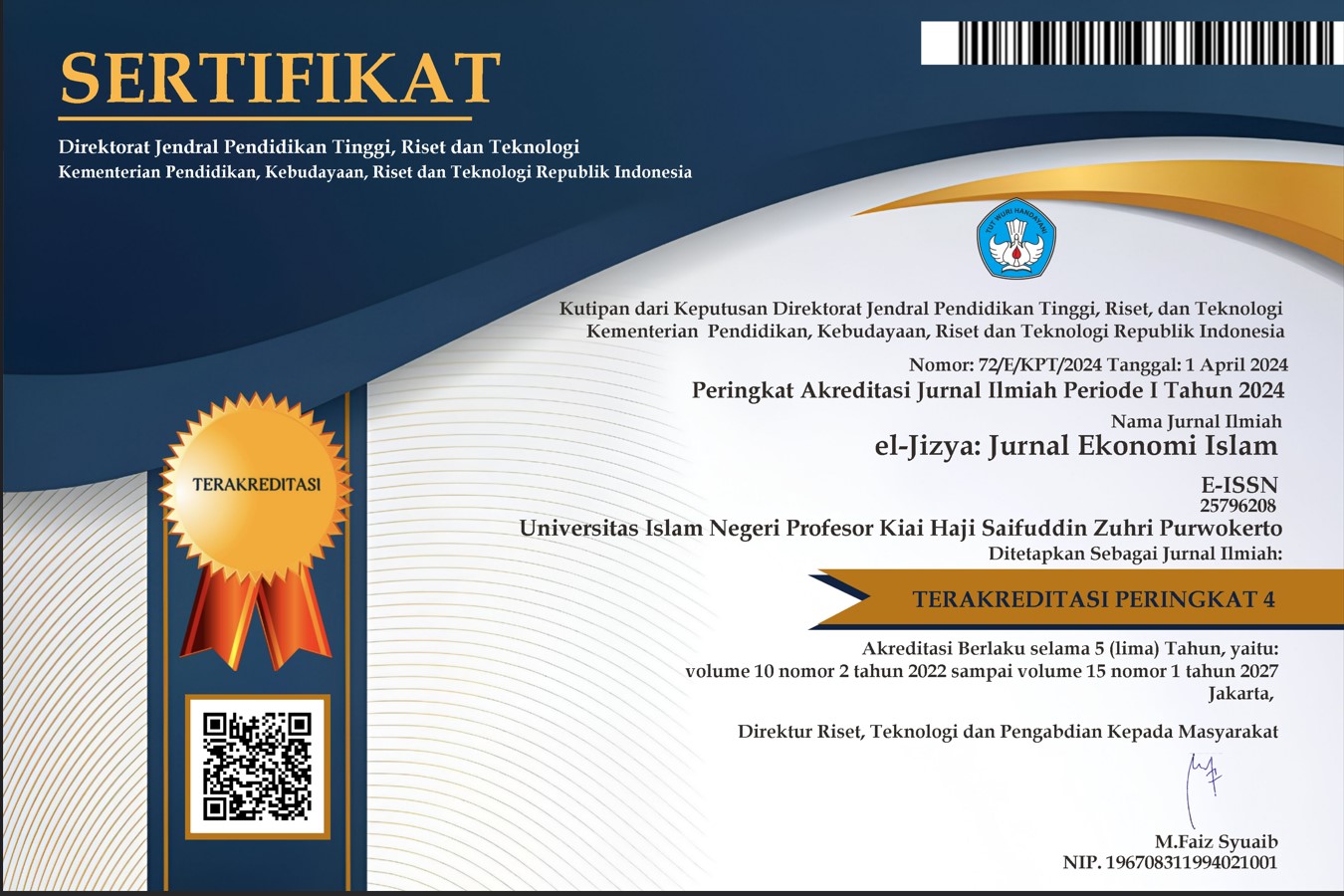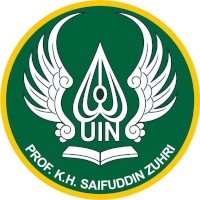Peran Finansial Technology sebagai Katalisator Intensi Literasi Keuangan dan Inklusi Keuangan Pada Usaha Mikro Kecil dan Menengah (UMKM) di Jawa Tengah
DOI:
https://doi.org/10.24090/ej.v12i2.11156Keywords:
Financial management, management information system, Darussalam dukuhwaluhAbstract
As technology and information advances, new products and services often appear in society. The presence of financial technology (fintech) as a credible financial institution is one of the services that can provide solutions business financing problem that often arise in society, especially in Micro, Small, and Medium Enterprise (MSMEs) In Central Java. Central Java Province is on of the best provinces in Indonesia according to the financial services authority because it implements the MSME digitalization empowerment program. The aim of this scientific research is to analyze and understand the role of fintech in development of MSMEs in Central Java. A descriptive qualitative approach was used in this research. Secondary data was obtained from books and journals. Based on the findings of this research, financial institution such as fintech are commited to increasing access to financing for Cental Java MSMEs. This can be seen in increasing MSME credit, as well as reducing interest rate on MSMEs Credit, in order to encourage credit growth for regional economic recovery. Furthermore, financial literacy in Central Java is higher than the national financial literacy index, while financial inclusion in Central Java is lower than the national financial inclusion index. The Central Java Government hopes to meet the national target of 90% by 2024.References
Annur, Cindy Mutia. (2022, Maret 23). “Sebanyak 102 Fintech P2P Lending Kantongi Izin dari
OJK”. Diakses dari https://databoks.katadata.co.id.
Arner, D. W., Barberis, J. N., & Buckley, R. P. (2015). The Evolution of FinTech: A New Post - Crisis Paradigm?. University of New South Wales Law Research Series.
Badan Pusat Statistik. (2020). Statistik UMKM Tahun 2020. Diakses dari
https://www.bps.go.id.
Bank Indonesia. (2022, Mei). Laporan Perekonomian Provinsi Jawa Tengah.
Diakses dari https://www.bi.go.id.
Berisha, G. & Pula, J.S. (2015). Defining Small and Medium Enterprise: A Critical Review.
Academic Journal of Business, Administration, Law and Social Sciences. Vol 1 No 1,
Maret 2015. IIPCCL Publishing, Tirana- Albania.
Cahya, Cun. (2020, Februari 25). “BI Jateng dan GPEI Adakan Pelatihan UMKM Go Ekspor”.
Diakses dari https://www.suaramerdeka.com.
Cahya, Cun. (2021, Desember 16). “Jateng Terbaik dalam Pemberdayaan UMKM,
Implementasikan Perluasan Akses Keuangan di Daerah”. Diakses dari
suaramerdeka.com.
Fahlefi, R. (2018). Inklusi Keuangan Syariah Melalui Inovasi Fintech di Sektor Filantropi.
Batusangkar International Conference III, 205–212.
pada
Fauzan, N. I., & Ahmad. (2019). Peran Financial Technology dalam Meningkatkan Keuangan
Inklusif
UMKM. Jurnal BJB University, 5(5),1–14 From
http://jurnal.unswagati.ac.id/index.php/jibm.
Jemadu, Liberty dan Dicky Prastya. (2022, Februari 21). “Jumlah Perangkat Seluler di
Indonesia Capai 370,1 Juta Pada 2022”. Diakses dari suara.com.
Kementerian Koordinator Bidang Perekonomian Republik Indonesia. (2022, Mei 20).
“Pengembangan UMKM Menjadi Necessary Condition untuk Mendorong Pertumbuhan
Ekonomi”. Diakses dari www.ekon.go.id.
https://www.finansial.com. (2018). Definisi Fintech. Diakses dari finansial.com/definisi
fintech-adalah/.
https://sikapiuangmu.ojk.go.id. (2021). “Hasil Survei Literasi Keuangan dan Inklusi Keuangan
Nasional Meningkat”.
htpps://www.kompas.com. (2022, Juni 19). “ Berdayakan UMKM Jateng, Lazada Hadirkan
AKAR Digital”.
https://www.metrojateng.com. (2022, Maret 25). “Dorong Peningkatan Literasi dan Inklusi
Keuangan, OJK Jateng Luncurkan Srikandi”.
Laut, L. T., & Hutajulu, D. M. (2019). Kontribusi Financial Technology dalam Meningkatkan Inklusi Keuangan di Indonesia.
Muzdalifa, Irma., Rahma., Inayah A., Novalia, Bella D. (2018). “Peran Fintech dalam
Meningkatkan Keuangan Inklusif Pada UMKM Di Indonesia. Jurnal Ekonomi dan
Perbankan Syariah. 3(1), 227-344.
Nengsih, N. (2015). Peran Perbankan Syariah dalam Mengimplementasikan Keuangan Inklusif
Di Indonesia. 14(2), 221–240.
Nicoletti, B. (2017). The Future of Fintech: Integrating Finance and Technology in Financial
Service. Cham, Switzerland: Palgrave Macmillan (Springer).
Nizar, M.A. (2017). Teknologi Keuangan (Fintech): Konsep dan Implementasinya Di
Indonesia. Retrieved Januari (5), 2021 from https://www.researchgate.net.
Nurjani, Aris. (2022, Juni 24). “Inklusi Keuangan Digital Mempermudah UMKM Mengakses
Pendanaan”. Diakses dari kontan.co.id.
Otoritas Jasa Keuangan. (2017). Strategi Nasional Literasi Keuangan Indonesia (Revisit 2017).
Otoritas Jasa Keuangan, 1–99.
Otoritas Jasa Keuangan. (2017). Financial Technology di Indonesia. Publikasi Otoritas Jasa
Keuangan.
Otoritas Jasa Keuangan. (2021, Desember 19). Strategi Nasional Literasi Keuangan Indonesia
(SNLKI) 2021–2025. Publikasi dari https://www.ojk.go.id.
Otoritas Jasa Keuangan. (2022). Financial Technology–P2P Lending. Publikasi Otoritas Jasa
Keuangan from https://www.ojk.go.id.
Peraturan Otoritas Jasa Keuangan Nomor 76/POJK.07/2016 tentang Peningkatan Literasi dan
Inklusi Keuangan di Sektor Jasa Keuangan Bagi Konsumen dan/atau Masyarakat.
untuk
Putri, Rizqa Leony. (2022, Agustus 11). “OJK Konsisten Memperluas Akses UMKM Jawa
Tengah
Mendapatkan
https://www.sindonews.com.
Bantuan
Permodalan”.
Diakses
dari
Rahardjo, B., Ekonomi, F., Tidar, U., Ikhwan, K. (n.d). Pengaruh Financial Technology
(Fintech).
Rahardyan, Aziz. (2021, Oktober 11). “Bank Dunia Ungkap Alasan Literasi Keuangan Digital
Indonesia Harus Digenjot”. Diakses dari bisnis.com.
Rahma, TIF. (2018). Persepsi Masyarakat Kota Medan Terhadap Penggunaan Financial
Technology (Fintech). At-Tawassuth, 3(1): 642-661.
Rubini, A. (2019). Financial Technology Made Easy (3rd edition). Berlin:Walter de Gruyter
Inc.
Santoso, Setyo Puji. (2022, Januari 25). “Pemerintah Gandeng Startup Dukung UMKM Jawa
Tengah Go Digital”. Diakses dari https://www.bisnis,com.
Sarma, M. (2008). Index of Financial Inclusion: Some Empirical Results. Diakses dari
https://doi.org/10.1007/978-81-322-1650-6_28
Sarma, M. (2015). Measuring financial inclusion. Economics Bulletin, 35(1), 604– 611.
Skan, L., Masood., dan Conway. (2014). The Boom in Global Fintech Investment.
United Kingdom. Accenture.
Statista. (2020). Fintech (Indonesia). Diakses
htpps://www.statista.com/outlook/295/120/fintech/indonesia.
dari
Sugiarti, Evy N., Diana N., Mawardi. (2019). “Peran Fintech dalam Meningkatkan Literasi
Keuangan Pada Usaha Mikro Kecil Menengah Di Malang”. E-JRA, 8(4), 90-104.
Sugiyono. (2008). Memahami Penelitian Kualitatif (Kesepuluh). Alfabeta. Sugiyono. (2017).
Metode Penelitian Bisnis: Pendekatan Kuantitatif, Kualitatif,
Kombinasi, dan R&D. Alfabeta.
Undang –Undang Nomor 20 Tahun 2008 tentang UMKM.
Vijayvargy & Bakhshi. (2018). “Financial Literacy and Financial Inclusion in Rajasthan, India:
An Empirical Study”. IUP Journal of Applied Finance, 24(3), 35–53.
Wachyu, W., & Winarto, A. (2020). Peran Fintech dalam Usaha Mikro Kecil dan Menengah
(UMKM). 3(1), 61-73.
Yalina, N., Kartika, A. P., & Yudha, A. T. R. C. (2020). Impact Analysis of Digital Divide on
Food Security and Poverty in Indonesiain 2015-2017. Jurnal
Manajemen
Teknologi,
(2),
https://doi.org/http://dx.doi.org/10.12695/jmt.2020.19.2.3.
–158.
Hadi, R. (2011). Manajemen keuangan: Konsep, teori, dan praktiknya di sekolah dan
pondok pesantren. STAIN Press Purwokerto.
Husni, K., & Saebani, B. A. (2015). Manajemen Perubahan Sekolah.
Littlejohn, S. W., Foss, A., & Hamdan, Y. (2009). Teori Komunikasi. Jakarta: Salemba
Humanika. Madjid, N. (1997). Bilik-bilik pesantren: Sebuah potret perjalanan.
Paramadina.
Mulyasa, E. (2004). Manajemen berbasis sekolah: Konsep, strategi dan implementasi.
Nunan, D., & Choi, J. (2010). Language and Culture: Reflective Narratives and the Emergence
of Identity. London: Rutledge.
Primantho, A. R. (2019). Implementasi Manajemen Keuangan Pendidikan di Pesantren
Mahasiswa Masjid Manarul Islam Pasuruan. Implementasi Manajemen Keuangan
Pendidikan di Pesantren Mahasiswa Masjid Manarul Islam Pasuruan.
Putri, R. A., & Sembiring, S. B. (2021). Pelatihan Desain Flyer Dan Kartu Nama dengan Metode Participatory Action Research (PAR). Jurnal IPTEK Bagi Masyarakat, 1(1), 17.
Sulthon, M., & Sulthon, M. (2006). Manajemen pondok pesantren dalam perspektif global.
LaksBang PRESSindo.
Suparta, M., & Haedari, A. (2003). Manajemen Pondok Pesantren. Jakarta: Diva Pustaka.
Downloads
Published
How to Cite
Issue
Section
License
Copyright (c) 2024 Sochimin Sochimin, Sasti Amar Sabila

This work is licensed under a Creative Commons Attribution-ShareAlike 4.0 International License.
Authors who publish with this journal agree to the following terms:
- Authors retain copyright and grant the journal right of first publication with the work simultaneously licensed under a Creative Commons Attribution-ShareAlike License that allows others to share the work with an acknowledgement of the work's authorship and initial publication in this journal.
- Authors are able to enter into separate, additional contractual arrangements for the non-exclusive distribution of the journal's published version of the work (e.g., post it to an institutional repository or publish it in a book), with an acknowledgement of its initial publication in this journal.
- Authors are permitted and encouraged to post their work online (e.g., in institutional repositories or on their website) prior to and during the submission process, as it can lead to productive exchanges, as well as earlier and greater citation of published work (See The Effect of Open Access).















